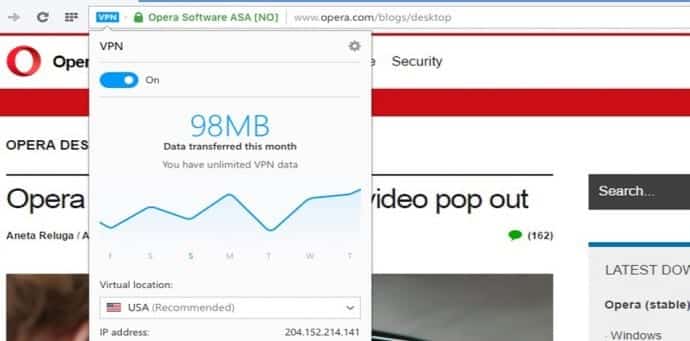Opera now offers free and unlimited inbuilt VPN feature in its web browser
Opera Software, a Norway-based company has become the first web browser offer a built-in free, unlimited and 256-bit encrypted virtual private network (VPN) service for everyone. It has integrated a VPN feature into the latest developer version of its free Opera web browser for OS X. This means the users can browse the web securely at the click of a switch.
Opera’s Free 256-bit encryption VPN service hides all your connection details and replaces your IP address with a virtual one, making it difficult for the government or anyone to trace your location, identify your computer or block content they do not want you to see.
For those unfamiliar, VPNs are easy security and privacy tools that route your Internet traffic through a distant connection, while protecting your browsing, enhancing security, hiding your location data and accessing restricted resources.
In a blog post, Opera’s engineering chief Krystian Kolondra wrote, “By adding a free, unlimited VPN directly into the browser, no additional download or extensions from an unknown third-party provider are necessary. So, today, our Opera desktop users get a handy way to boost their online privacy, as well as easier access to all their favorite online content no matter where they are.”
VPNs normally come in the form of separate plug-ins or apps that need a paid subscription, making Opera one the first major browsers to include one as standard. The launch of the feature comes after Opera’s acquisition of U.S. VPN company SurfEasy last March.
Steve Kelly, VP Marketing of SurfEasy tells that privacy and censorship were the main reasons to add the free VPN to Opera.
“Everyone deserves to surf privately online if they want to. Today, it is too difficult to maintain privacy when using the web, and way too many people experience roadblocks online, like blocked content,” Kelly says.
“By releasing an integrated, free and unlimited VPN in the browser, we make it simple for people to enhance their privacy and access the content they want,” he adds.
It is worth noting that the VPN connection is limited to the web browser. This means that any content shared outside the browser, through traditional torrent clients for example, is not private.
To use the new service, you just need to download the developer version of Opera. To activate it, Mac users just need to click the Opera menu, select “Preferences” and toggle the feature VPN on, while Windows and Linux users need to go to the “Privacy and Security” section in “Settings” and enable VPN there. A button will appear in the browser address field, from which the user can see and change location (more locations will appear later), check whether their IP is exposed and review statistics for their data used.
Once you enable it in Opera’s settings, you will find a VPN button built directly into the browser’s search bar – right next to the address of the website you are visiting. Simply press this button to divert your web traffic via Opera’s secure VPN servers. You can choose between VPN servers in the U.S., Canada and Germany – with the closest server typically giving you the fastest web browsing speeds.
According to Global Web Index, more than half a billion people (24 percent of the world’s online population) have tried or are currently using VPN services. The research claims that the main reasons people use a VPN are for better access to entertainment content, browser anonymity, and the ability to access sites restricted by their workplace or country.
The new VPN is definitely an interesting move from Opera and an obvious bid to attract more tech-savvy users. It is also great for people who want to make sure their data is private in any public place, or who just don’t like the idea of side jacking attacks stealing their credentials, or who want to stream a movie, YouTube video, or audio track that’s not available in their country. It’s more of a replacement for browser-based tools than a fully featured, system-wide VPN.

